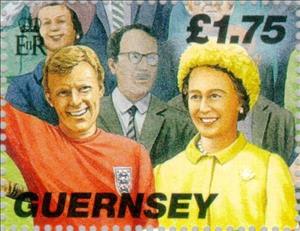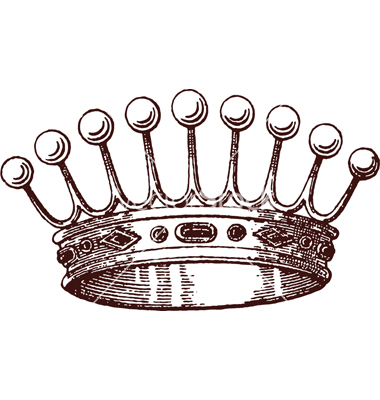Stamp: Bobby Moore & Queen Elizabeth II (Guernsey 1998)
Bobby Moore & Queen Elizabeth II (Guernsey 1998)
07 May (Guernsey ) within release 150th Anniv of the Cambridge Rules for Football goes into circulation Stamp Bobby Moore & Queen Elizabeth II face value 1.75 Guernsey pound
| Stamp Bobby Moore & Queen Elizabeth II in catalogues | |
|---|---|
| Michel: | Mi:GG 780 |
| Stanley Gibbons: | Sg:GG 780b |
| AFA number: | AFA:GG 767 |
Stamp is horizontal format.
Only sold as part of minisheet SGMS780. Designed by A. Peck. Printed by Joh. Enschede.Also in the issue 150th Anniv of the Cambridge Rules for Football:
- Stamp - Jules Rimet face value 30;
- Stamp - Bobby Moore & Queen Elizabeth II face value 1.75;
Stamp Bobby Moore & Queen Elizabeth II it reflects the thematic directions:
A Royalty is the immediate family of a king or queen regnant, and sometimes his or her extended family. The term imperial family appropriately describes the family of an emperor or empress, and the term papal family describes the family of a pope, while the terms baronial family, comital family, ducal family, grand ducal family, or princely family are more appropriate to describe the relatives of a reigning baron, count, duke, grand duke, or prince. However, in common parlance members of any family which reigns by hereditary right are often referred to as royalty or "royals." It is also customary in some circles to refer to the extended relations of a deposed monarch and his or her descendants as a royal family. A dynasty is sometimes referred to as "the House of ...". As of July 2013, there are 26 active sovereign monarchies in the world who rule or reign over 43 countries in all
Famous People refers to the fame and public attention accorded by the mass media to individuals or groups or, occasionally, animals, but is usually applied to the persons or groups of people (celebrity couples, families, etc.) themselves who receive such a status of fame and attention. Celebrity status is often associated with wealth (commonly referred to as fame and fortune), while fame often provides opportunities to make money.
Sports, are all usually forms of competitive physical activity or games which, through casual or organised participation, aim to use, maintain or improve physical ability and skills while providing enjoyment to participants, and in some cases, entertainment for spectators. Usually the contest or game is between two sides, each attempting to exceed the other. Some sports allow a tie game; others provide tie-breaking methods, to ensure one winner and one loser. A number of such two-sided contests may be arranged in a tournament producing a champion. Many sports leagues make an annual champion by arranging games in a regular sports season, followed in some cases by playoffs. Hundreds of sports exist, from those between single contestants, through to those with hundreds of simultaneous participants, either in teams or competing as individuals. In certain sports such as racing, many contestants may compete, each against each other, with one winner.
Football or soccer, is a team sport played between two teams of eleven players with a spherical ball. It is played by 250 million players in over 200 countries and dependencies making it the world's most popular sport. The game is played on a rectangular field with a goal at each end. The object of the game is to score by getting the ball into the opposing goal. Players are not allowed to touch the ball with their hands or arms while it is in play, unless they are goalkeepers (and then only when within their penalty area). Other players mainly use their feet to strike or pass the ball, but may also use their head or torso. The team that scores the most goals by the end of the match wins. If the score is level at the end of the game, either a draw is declared or the game goes into extra time or a penalty shootout depending on the format of the competition. The Laws of the Game were originally codified in England by The Football Association in 1863. Association football is governed internationally by the International Federation of Association Football (FIFA; French: Fédération Internationale de Football Association), which organises World Cups for both men and women every four years.
An anniversary is the date on which an event took place or an institution was founded in a previous year, and may also refer to the commemoration or celebration of that event. For example, the first event is the initial occurrence or, if planned, the inaugural of the event. One year later would be the first anniversary of that event. The word was first used for Catholic feasts to commemorate saints. Most countries celebrate national anniversaries, typically called national days. These could be the date of independence of the nation or the adoption of a new constitution or form of government. The important dates in a sitting monarch's reign may also be commemorated, an event often referred to as a "Jubilee".





